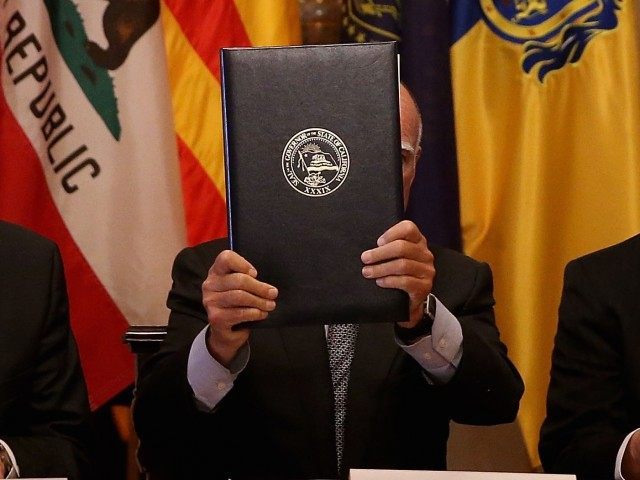California Gov. Jerry Brown and a bipartisan group of 17 states governors signed a pact on Jan. 16 to jointly develop cleaner energy and transportation in anticipation of the U.S. shift to renewable fuels.
The resolution — known as the “Governors’ Accord for a New Energy Future” — calls for new planning and policies for energy solutions that expand the economy, while protecting the health of communities and environmental resources.
The group tried to avoid discussing the very divisive issue of climate change. Instead, they spoke about building more sophisticated and energy-efficient regional electrical grids; pooling buying power to purchase cheaper clean-energy vehicles for state fleets; and lobbying the federal government for more research and development funds for energy storage.
Washington’s Gov. Jay Inslee said in a conference call with reporters, “We believe that this is a robust driver of economic growth, not a brake on economic growth.”
But when Brown came on the call he tried to introduce the concept of implementing a “revenue-neutral carbon tax.”
Brown claimed that former Bush Secretary of State George Shultz and President Regan’s economic advisor Arthur Laffer have both endorsed the idea. Brown said: “I would emphasize, from the conservative point of view, revenue neutrality is key because a carbon tax would require a reduction in other taxes.”
Taxes are something that Jerry Brown is very familiar with, given that he raised California’s income and gas taxes to the highest level of any state in the nation.
The issue of finding new taxes is especially timely for Brown. Breitbart News recently reported that the bipartisan California Legislative Analysts’ Office found that the state budget fell from a surplus in December 2015 to a deficit in January after tax collection fell $247 million short for the month.
Brown knows that as free market economists, both Shultz and Laffer have never backed a new carbon tax. What they have said is that if the governor and the legislature want to set different priorities without having a negative economic impact across the entire state economy, they could reduce tax spending in one area and raise it in another area.
Laffer, who is a fellow at the American Enterprise Institute, said last year that “The most preposterous thing about a carbon tax” … “is the pretense that it will curb carbon emissions.” He added that “whether it’s called cap-and-trade or a carbon tax, California is now stuck with a fee on the carbon content of fuels.” To Laffer, the current California cap-and-trade law is just another “75 cents per gallon” tax on consumers at the pump.
But with Brown having introduced his “revenue neutral carbon tax” concept, he acknowledged, “Any time you talk about a tax, we politicians are going to tread very, very lightly.”
The other participating governors are from Delaware, Connecticut, Hawaii, Iowa, Massachusetts, Michigan, Minnesota, New Hampshire, Nevada, New York, Oregon, Pennsylvania, Rhode Island, Vermont and Virginia.

COMMENTS
Please let us know if you're having issues with commenting.